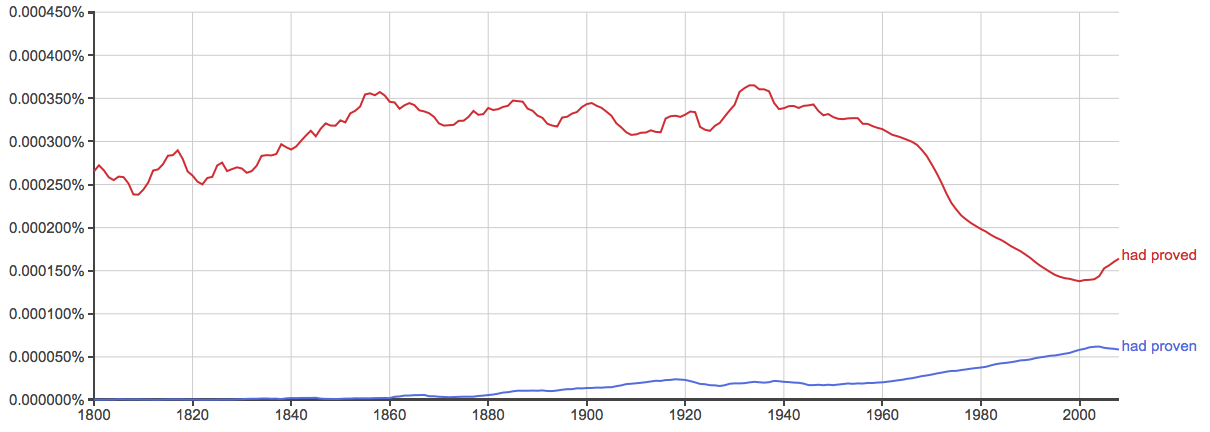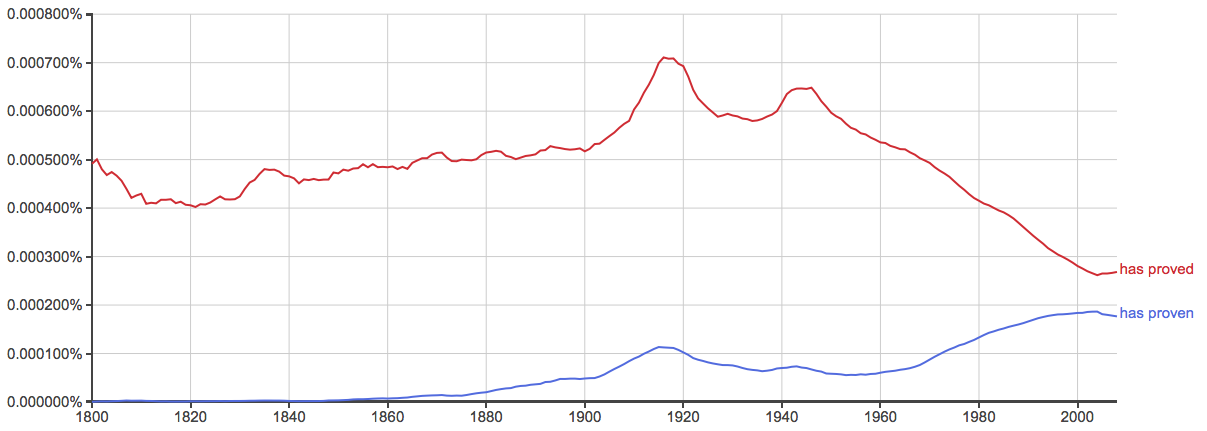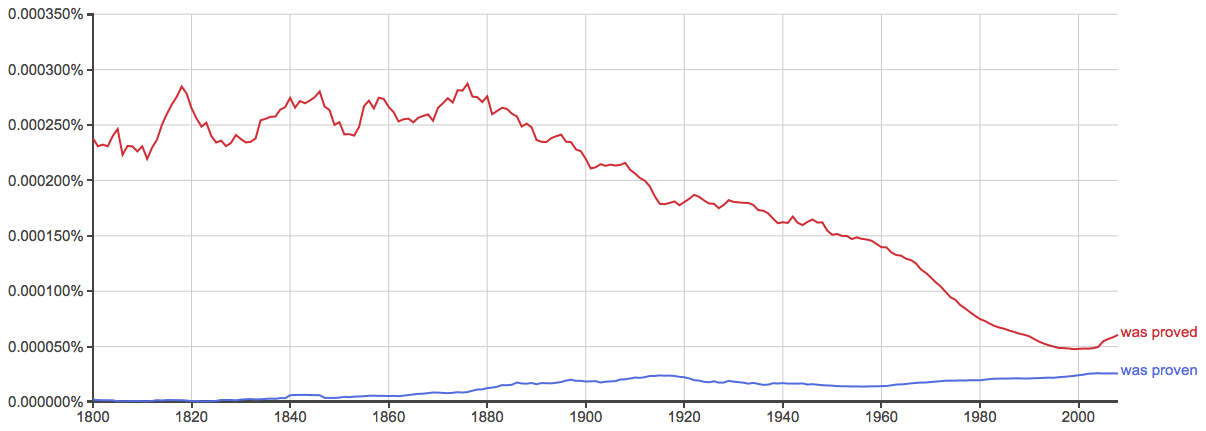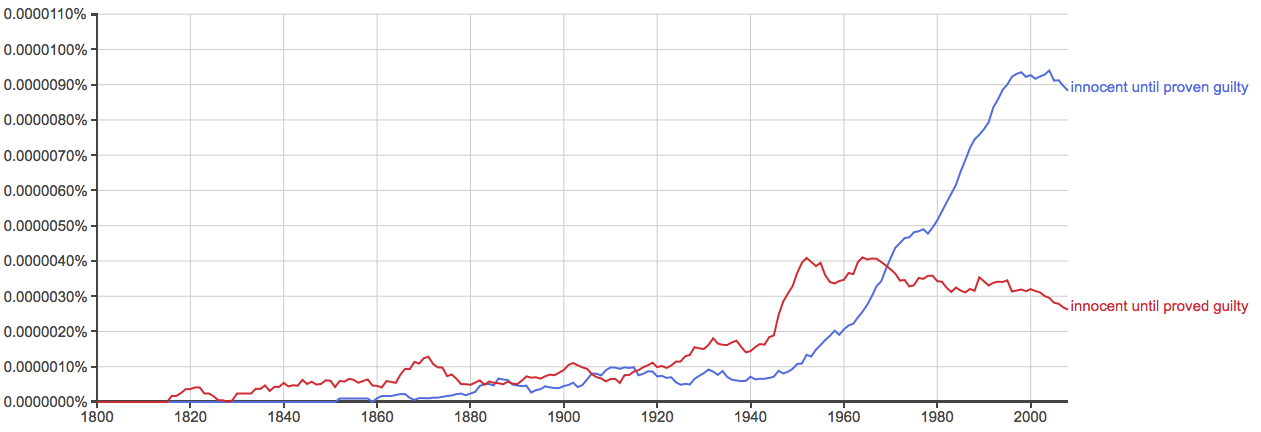When it comes to making a new friend, would you say she has proven trustworthy or she has proved trustworthy? The common phrase innocent until proven guilty may come to mind—so does this mean proven is acceptable and proved is not? The answer may surprise you. Although we sincerely hope you don’t have reason to use this particular legal phrase in your own personal life, you should familiarize yourself with the differences and similarities between proved and proven, two commonly confused words.
The history of proved vs. proven
The debate between Team Proved and Team Proven has been going on for centuries. Both words are forms of the verb prove, which means “to establish truth through evidence or argument.” Both words are past participles, which basically means they completed actions that took place in the past. A past participle is frequently used with a helping verb (like has, have, or had), as in I had proved my point.
Let us lend you a helping hand in figuring out when to use have vs. has.
Proved is the older form of the word. Proved is both a past participle and also the past tense of prove. I proved you wrong is an example of the word being used in the past tense. When proved is used as the past tense, it could never be exchanged with proven.
But proved and proven both function as past participles, so they cause confusion. Why is that? Well, basically, over time the word prove developed a second past participle form: proven. Geoffrey Chaucer used proven in his works from the 1300s, but it wasn’t that quickly accepted in the literary world. Proven was mostly used in legal contexts for a long time. In the 1800s, British poet laureate Alfred Lord Tennyson used it frequently in his work. So we can assume it had caught on by then. But proved remained much more common in written work since 1750 and up until the 1980s, when the two began to appear in similar numbers.
How do you use proved and proven?
Today, both proved and proven are now considered correct. Still, two major style guides, The Chicago Manual of Style and The Associated Press Stylebook, prefer proved as the past participle. Throughout the 1800s, grammar guides recommended proved over proven, and that advice has stuck with us to a certain extent.
Proven is most commonly used as an adjective before the noun it modifies. For example: The new team owner has a proven track record of success in the business world. Here, proven describes (or modifies) track record. Another example would be Honey is a proven remedy for a sore throat. In this case, proven describes the type of remedy honey is.
As a past participle, proven is the accepted form in Scotland and the preferred form throughout North America. Proved tends to be the word of choice in England, although even the British use proven on occasion. Some familiar phrases (like innocent until proven guilty) are readily accepted as correct by both American and British style guides.
Some grammar experts will insist that proven should only ever be an adjective. However, its use as a past participle of prove is widely accepted by dictionaries and style guides.
At the end of the day, proved and proven are pretty much interchangeable. You can basically go with whichever sounds best with the rhythm and flow of the sentence.
Verb conjugation is difficult even for experienced English writers. There are nearly 200 irregular verbs in English, so it would be an ambitious endeavor to try to memorize them all.
Prove is one such irregular verb. Proved and proven both see use in this verb’s past tense conjugations, but which one is the better choice?
What is the Difference Between Proved and Proven?
In this post, I will compare proved vs. proven. I will show you example sentences for each variation of this verb and guide you on the best choice for your writing.
Plus, I will outline a helpful memory tool that you can use as a trick to remember whether to use proved or proven in a sentence.
When to Use Proved

Proved is the simple past and past participle form of this verb, as you can see from the sentences below,
- Yesterday, Eric proved his impressive skills by outselling the rest of the sales force combined.
- “I have proved you wrong through indisputable logic!” claimed the debate team leader.
- But how do you attract high-quality team members before you’ve proved your company’s viability through funding, revenue or customers? –The Wall Street Journal
Proved is useful for all past tense conjugations of prove, including the following tenses,
- Simple past: I/we/you/he/she/they proved
- Past participle: I/we/you/he/she/they have proved
- Past perfect: had proved
Proved never functions as an adjective: only a verb.
When to Use Proven

Here are a few examples,
- Major league baseball managers entrust their late-inning bullpen work to proven performers who will get outs without allowing runs.
- “I don’t want Carol as an administrative liaison; she is a proven liability,” said Marcus.
- There is no proven treatment, he said. It is not clear that plasma exchange helps. –The New York Times
Occasionally, some writers use proven instead of proved as the past participle form of prove. This is much more common in American English than British English (In British English, proved remains the sole standard past participle.)
For example,
- “I have proven my critics wrong beyond any shadow of a doubt,” asserted the comeback player of the year.
- “I resent this line of questioning, because I have already proven these accusations to be false,” said the defendant.
As the Oxford English Dictionary states,
For complex historical reasons, prove developed two past participles: proved and proven. Both are correct and can be used more or less interchangeably.
As with most usage debates, not everyone agrees. For instance, The AP Stylebook states,
Use proven only as an adjective: a proven remedy.
That said, the usage of proven as past participle has grown in recent years.
These charts graph proven vs. proved in English books since the year 1800. Proved is still ahead across World English, but the two uses might eventually meet.
As for today’s writing, especially formal writing, it is best to stick to the traditional rule that AP Style lays down.
- Use proved as a past participle.
- Use proven as an adjective.
It should be noted, however, that the phrase innocent until proven guilty is so common that it must count as an exception to this rule. As you can see below, in this specific phrase, proven is much more common than proved.
Trick to Remember the Difference

Similarly, if you need a simple past verb, proved is the only correct word. Another easy choice.
For past participles, though, the situation is not so clear. Both proved and proven are commonly used as past participles. Even though proved has a longer history as a past participle and is used more often, there is no universal rule against using proven. Some places discourage its use, while others do not.
With British audiences, proved is still probably a better choice since it is much more widely used than proven. You should probably also default to proved with American audiences since major U.S. style guides like The AP Stylebook still make the preference quite clear.
Since proved and default both contain the letter D, you should find it easy to remember that proved is the default past participle of prove.
Summary
Is it proven or proved? The confusion around these two words surrounds their use as a past participle.
- Proved is the simple past tense and past participle of the verb prove, which means to show evidence for something.
- Proven is the adjective form of this word, and can be used as a past participle in some instances.
- Most places prefer proved as a past participle and proven as an adjective.
Contents
- 1 What is the Difference Between Proved and Proven?
- 2 When to Use Proved
- 3 When to Use Proven
- 4 Trick to Remember the Difference
- 5 Summary
-
#1
Good evening,
Is there a difference between «proved» and «proven»? Which one is the past participe of to prove? Which one sounds better in a scientific context:
It is not yet proven/proved, it has not been proved/proven yet…
Thanks a lot!
-
#2
He proved that she had killed him.
It was proven that she had killed him.I think it’s that you can’t say «He proven» It must be: subject + to be + proven.
-
#3
It’s either, «it has been proven» or «(s)he proved it».
I think they’re both used as past participles, but proven is the passive voice (ie no-one is identified as doing the action) whereas proved is the active voice. Does that make sense?
-
#4
Thanks all!
So, just to be sure, because there is no active/past participe in your examples: is it
I have proved?
Thanks again
-
#5
Hang on… I think I’ve got that wrong — sorry!!! Yeah I think you can use either as a past participle…
Just asked my dad (lecturer of linguistics at local university). He thinks that both proved and proven are past participles, but proved is also the past tense. Also that proven would be more formal than proved.
So sorry to miss inform you first time round.
So you could use i have proved or i have proven, but proved is more normal in that context
-
#6
Hang on… I think I’ve got that wrong — sorry!!! Yeah I think you can use either as a past participle…
Just asked my dad (lecturer of linguistics at local university). He thinks that both proved and proven are past participles, but proved is also the past tense. Also that proven would be more formal than proved.
So sorry to miss inform you first time round.
So you could use i have proved or i have proven, but proved is more normal in that context
I’ve never known the rule, but this sounds right to me.
-
#7
I’m studying English, French and Spanish at university, and it’s:
I prove
I am proving
I proved
I have proven
..I registered just so that I could write a response
to this! lol Because on BBC1 it REALLY annoyed me
how the presenter said «…until it was proved..» PROVEN!
It should/would be «…until it proved otherwise» but
here, it should be «…until it was proven otherwise».
Deary me! lol … =)
-
#8
Sorry to disagree with you in your first post, nicen1ck, but as Bananastasia’s dad said:
— the past tense is proved : I proved you right
— the past participle (as used in, say, the present perfect and in passive constructions) is EITHER proved OR proven: I’ve proved you right OR I’ve proven you right / I’ve been proved wrong OR I’ve been proven wrong
Except in very limited circumstances requiring a pre-set phrase (e.g. the Scottish legal verdict of «not proven»), you can decide for yourself whether to use proved or proven as the past participle. So the BBC reporter was perfectly entitled to say «it was proved otherwise».
-
#9
Just to say that even the Oxford English Dictionary allows for either proved or proven as the past participle, so you can say it has been proved or it has been proven: just try to be consistent.
-
#10
As others have said, both are correct. For whatever reason, scientists in both speech and scientific writings seem to use «have/has proved» almost exclusively. It seems like every science professor I’ve had, every scientist I hear on TV, and every scientific writing I read uses «proved». I have no idea why this is, and frankly, it annoys me a little. I think «have/has proven» sounds much better and more natural. For what it’s worth I grew up using «proven» and for a long time was unaware that «proved» was also considered correct.
-
#11
Just to add that in attributive use, proven seems much more common — therefore, a proven fact is more likely than a proved fact.
xjm
Senior Member
-
#12
As I recall, this an example of a common linguistic tendency to «over-correct» and apply an irregular rule to a word that was originally regular. It happens a lot in English with past participles being conjugated with «-en» rather than an earlier «-ed.» I suspect that if you looked it up, had proved might be attested earlier than had proven. (I can’t log into the OED at the moment, which I’m sure has this information.)
Another example of two variations of a participle is in has mowed versus has mown; you will find speakers with a very strong allegiance to one or the other, but both are permissible.
An example of over-correcting with a noun would be the use of octopi as a plural for octopus. (A linguist called this one to my attention years ago.) Octopus is from Greek, not Latin, so it would be pluralized as something like octopodes if one were following Greek rules. People say octopi because they know they are supposed to follow an irregular pattern—changing «-us» to «-i»—for words that come from Latin like cactus and fungus.
-
#13
As I recall, this an example of a common linguistic tendency to «over-correct» and apply an irregular rule to a word that was originally regular. It happens a lot in English with past participles being conjugated with «-en» rather than an earlier «-ed.» I suspect that if you looked it up, had proved might be attested earlier than had proven. (I can’t log into the OED at the moment, which I’m sure has this information.)
You’re spot on, xjm.
Here’s the OED
The past participle proven, originally Scots and the usual form in Scottish English, developed from the [-en] forms by analogy with strong verbs like cloven, past participle of CLEAVE v.1, woven, past participle of WEAVE v.1 It is at least as common as proved in current North American English. It is also spreading into other varieties of English, in which the highest proportion of occurrences appears to occur in the past and perfect passive. Compare PROVEN adj., PROVED adj.
As prove is a loan-word from French, there is no strong reason for it to have an irregular (strong form) past participle.
-
#14
I agree with Natkretep about proven being more likely as an attribute.
I sense a difference between «a proven fact» and «a proved fact». The latter is like «an opened door», and refers to the fact’s having gotten proved; the former sounds more like a fact you had best not argue with, as «an open door» sounds like an invitation.
Proven is usually an adjective (e.g., a proven formula), and proved is usually the inflected form of the verb prove (e.g., I proved it; I have proved it). This is not a rule, though, and exceptions abound, especially in American English, where proven is often used as a participial inflection of the verb. For example, where a British writer is likely to write I have proved you wrong, an American writer might write I have proven you wrong.
Both forms are many centuries old. Proven appears in the 15th-century works of Chaucer, for instance. But proved has always been the prevalent inflection ever since prove emerged from its pre-Middle English roots, and only over the last century or so has proven gained significant ground. This doesn’t mean proven is wrong, though. It is a very well-established form, and only a few people from outside North America consider it questionable.
Examples
These writers use proven (as an adjective) and proved (in the past and perfect tenses) according to modern conventions:
Traders can use divergence analysis and proven indicators like the Advance/Decline Line to identify critical market turning points. [Forbes]
The African Union, in fact, has proved itself both unwilling and, when it does attempt to act, incompetent to deal with sub-Saharan Africa’s chronic crisis. [Winnipeg Free Press]
So he would bring to the job both unique internationalist credentials and a proven ability to get big things done. [Financial Times]
The Lions have proved that a home team can, in fact, win at the Gabba this year. [Brisbane Times]
But proven often appears in perfect-tense constructions—for example:
It is in this context that Jean-François Kahn’s phrase has proven equally infelicitous and illuminating. [Guardian]
Still, 86 percent of college graduates agreed that attending college had proven to be a good personal investment, it said. [Washington Post]
Several readers have asked for clarification on the words proved and proven.
Both are forms of the verb prove: “to demonstrate or establish as true.”
As a regular transitive verb, prove has the following principal parts:
prove (present)
proved (simple past)
have proved (past participle)
proving (present participle)
The form proven is an irregular past participle form. One can say either, He has proved his theory, or He has proven his theory.
According the OED, proven is “the usual form [of the past participle] in Scottish English and also the preferred form in current North American English.”
That’s not to say that it doesn’t appear in British publications:
James Milner says that Manchester City have proven that they can win ugly –The Daily Mail
Here is a sampling from the Web. It’s not always possible to discern the country of origin:
We’ve proved that we can’t be trusted with setting passwords.
[Pope] Francis has proven to be a crowd favorite for many young people.
Women have proved that they can win the race.
Barry Beach has proven himself an asset to community, deserving of clemency
Brandon High has proven to be the community’s leadership institute
Quality early education has proven economic benefit for community
The Chicago Manual of Style and the AP Stylebook advise against the use of proven as a past participle, but Paul Brians (Common Errors in English Usage) opines that, “For most purposes either form is a fine past participle of prove…”
Proven as an adjective preceding a noun is standard in both British and American usage:
Five Proven Facts that Make Yoga Awesome
This Politician is a Proven Liar
Capaldi [the new Dr. Who] is a fine actor, who has a proven track record in comedy and drama…
To sum up:
Proved is the past tense of the verb prove. Both proved and proven are are acceptable as past participle forms.
British and some American style guides recommend proved as the only past participle, admitting of established set phrases like “innocent until proven guilty.”
Proven as an adjective preceding a noun is standard usage in both British and American usage.
Pronunciation note: Americans pronounce the adjective proven with the same “oo” vowel as prove: [PROOV-n]. British speakers pronounce proven with a long o: [PRO-vn]
Stop making those embarrassing mistakes! Subscribe to Daily Writing Tips today!
You will improve your English in only 5 minutes per day, guaranteed!
Subscribers get access to our archives with 800+ interactive exercises!
You’ll also get three bonus ebooks completely free!






